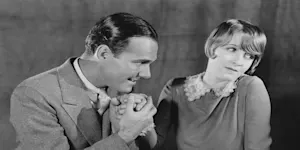What Makes This Word Tick
Ah, "guffaw"—such a hearty, full-bodied word for laughter that it's almost impossible to say without cracking a smile. This isn’t just any giggle; a guffaw is a deep and unrestrained burst of laughter. It’s the kind that comes from a good joke or an unexpected delight, and often takes everyone around by surprise.
If Guffaw Were a Person…
Guffaw would be that jolly friend who always knows how to lighten the mood. Picture someone with a booming voice, a contagious laugh, and a knack for finding humor in everyday situations. They'd be the life of the party, sharing amusing stories and making everyone feel like part of the fun.
How This Word Has Changed Over Time
Originally appearing in the early 18th century, "guffaw" has maintained its original meaning of a loud laugh throughout the years. It came into English usage likely from the Scots language, capturing the essence of spontaneous merriment. Unlike some words that evolve or lose their tint over centuries, guffaw remains as boisterous as ever.
Old Sayings and Proverbs That Use Guffaw
Though guffaw itself isn't embedded in many proverbs, laughter certainly is. Think of sayings like "Laughter is the best medicine"—a concept well captured by a good guffaw, which can lift spirits and lighten any heavy atmosphere.
Surprising Facts About Guffaw
Did you know a guffaw can be contagious? Studies suggest that hearing spontaneous, hearty laughter prompts others to join in, spreading joy more like a ripple effect. It's also scientifically linked to releasing endorphins, giving both the laugher and listener a natural high.
Out and About With This Word
You'll often find "guffaw" used to describe laughter in humorous performances or situations, especially in reviews of comedies. It's a favorite descriptor among critics who want to convey just how uproarious an audience or scene was.
Pop Culture Moments Where Guffaw Was Used
In classic sitcoms, laugh tracks sometimes attempt to mimic the sound of a good guffaw to cue audience reactions. Shows like "Friends" and "Seinfeld" have had moments where the characters' quick wit sparked collective guffaws from live audiences.
The Word in Literature
Fiction, especially comedy and drama, loves a good guffaw. Characters who guffaw are often portrayed as larger-than-life and genuinely jovial. Authors from Charles Dickens to P.G. Wodehouse have effortlessly painted scenes of merry laughter enhanced by a well-placed guffaw.
Moments in History with Guffaw
Imagine Winston Churchill, known for his wit, sharing a snappy retort in Parliament that led to guffaws echoing through the hall. Or picture Mark Twain on a lecture tour, charming audiences into fits of guffaws with tales of life on the Mississippi.
This Word Around the World
In different languages, the concept of a guffaw finds its counterparts. For instance, the Swedish "skratta gott," which means 'laugh heartily.' Each culture has its own way of expressing this kind of joyous laughter, bridging language barriers through a universal sound of happiness.
Where Does It Come From?
"Guffaw" likely finds its roots in the Scots language, related to the word "gawf," which means to laugh loudly. It perfectly captures the essence of uninhibited and robust laughter, making its way into standard English with little alteration.
How People Misuse This Word
People sometimes confuse a guffaw with a mere chuckle, but a chuckle is more subtle and contained. A guffaw is anything but—it’s about letting go and enjoying a loud, hearty laugh, not to be confused with its daintier cousin.
Words It’s Often Confused With
Chuckle: A soft, quiet laugh, often to oneself.
Snicker: A half-suppressed laugh, usually more mischievous.
Giggle: Light and silly, more common in nervous situations.
Additional Synonyms and Antonyms
Synonyms include howl, cachinnate, and belly laugh. As for antonyms—think of quiet sighs or silence, any scenario where laughter is remarkably absent.
Want to Try It Out in a Sentence?
Sure thing! "As the comedian delivered his punchline, the room erupted in a chorus of guffaws, the sound echoing joyfully off the walls." That sentence captures the essence of the word—big, bold, and undeniably happy.
















